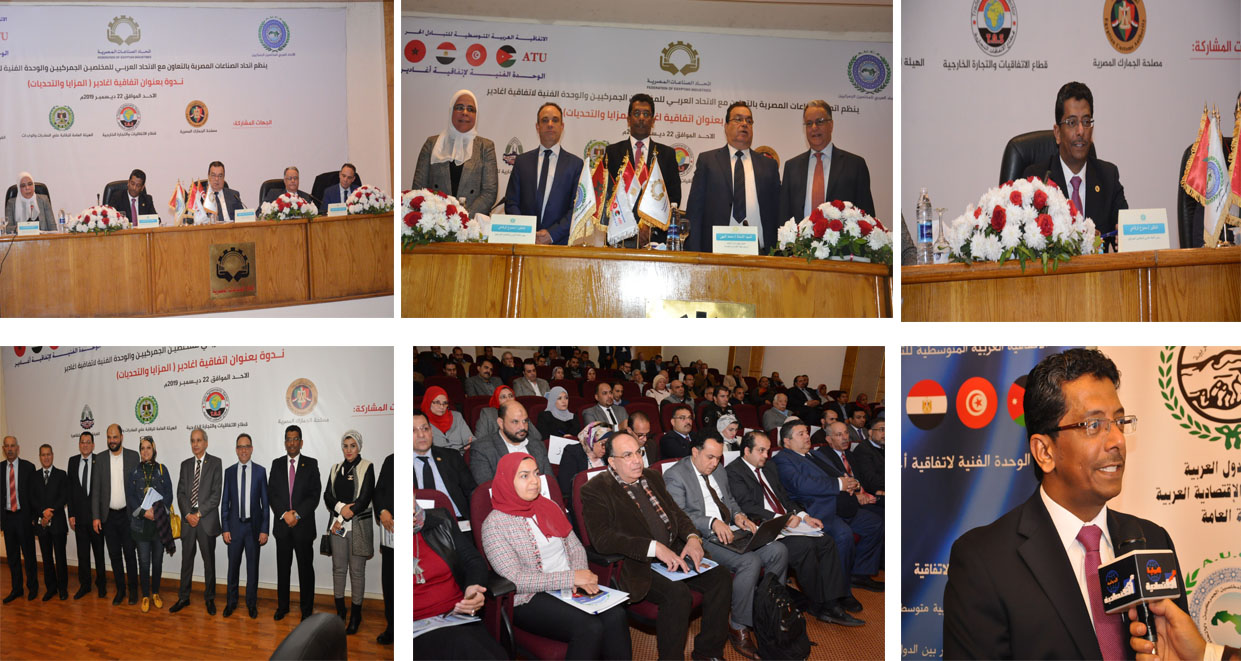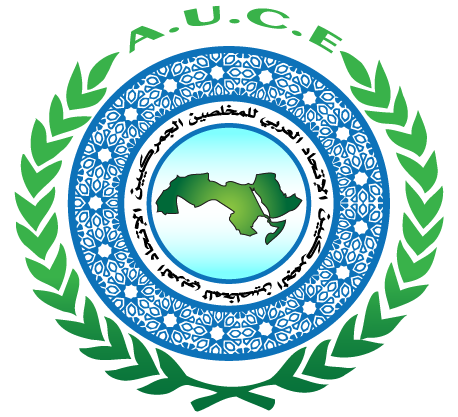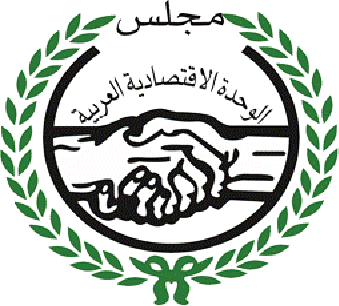The Arab Union of Customs Broker Helds a Series of Symposiums on the Advantages of the Agadir Agreement

The Arab Union of Customs Brokers, headed by Dr. Mamdouh Al-Rifai, , is
organizing a symposium on the free trade exchange agreement between the Arab
Mediterranean countries, "the Agadir Agreement ... advantages and
challenges." Today, Sunday, December 22, 2019, in cooperation with the
Federation of Egyptian Industries and the technical unit of the Agadir
Agreement and with the participation of the Egyptian Customs Authority and the
General Authority for Export and Import Control and the Agreements and Foreign
Trade Sector, in order to get acquainted with the services provided by those entities
within Agadir Agreement framework.
Mohamed El-Bahi, head of the Taxes and Customs Committee of the
Federation of Industries, opened the events of the symposium, which provides
many promising opportunities in the coming period to be utilized by the member
states (Egypt - Morocco - Tunisia - Jordan). Moreover, he indicates that this
an agreement for free trade exchange between the Arabic countries, where four
Arabic Mediterranean countries signed the Declaration of Agadir in 2004 and began
the actual implementation of the agreement on the ground in 2007, but there are
still many obstacles to implementing the agreement that we seek to overcome by our
recommendations depending on the symposiums.
Ambassador Mohamed Al-Rabei, Secretary-General of the Arab Economic Unity
Council, valued the efforts of the Federation of Egyptian Industries and the
Arab union for customs brokers and the technical unit to Agadir in organizing
the events of this symposium, which aims to introduce the goals and benefits of
the Agadir Agreement and how to benefit from them in addition to the
developments of customs cooperation between the member states of the agreement
that serve the economic customer and shedding light on the role of the Agadir
Agreement Business Council, and identifying the challenges and obstacles facing
the economic establishments.
The Ambassador affirmed that the Arab union of Customs Brokers was able,
within a short period of time, to achieve what many Arab unions could not
achieve in inter-Arab cooperation.
Dr. Mamdouh Al-Rifai, head of the Arab union of Customs Brokers, pointed
out that customs cooperation among member states of the Agadir Agreement is the
most prominent in the Arab region, and we commend the effective role played by
customs authorities in implementing the Agadir Agreement by facilitating
customs procedures and overcoming any obstacles that might hinder the trade
exchange efforts.
Dr. Al-Rifai added that this symposium is the beginning of a series of symposiums
to introduce the Agadir Agreement and its advantages to the Arab economic
customer in the member countries. The Union provides a hand of support and
assistance to the Agadir countries in everything they need in order to
facilitate the intra-trade movement between the Arab countries.
Dr. Amani Al-Wasal, Head of the Agreements and Foreign Trade Sector,
stated that the original agreement includes a kind of strengthening industrial
integration and accumulation of origin between the countries and members in
Egypt.
Amani Al-Wasal continued that the real goal is to expand the agreement
and secure inter-investment and increase the Egyptian commercial growth rates
to increase exports to European Union countries.
The Head of the Agreements Sector announced that the Egyptian exports to
the Agadir Agreement Member States increased by 20% during the past three years
As for the CEO of the Technical Unit of the Agadir Agreement, Dr. Youssef
Tarifa, he thanked the Egyptian Industries Federation and the Arab union of
Customs Brokers for their joint cooperation to introduce the advantages of the
Agadir Agreement to increase trade exchange and joint investments in a way that
contributes to enhancing trade with European nations.
Dr. Tarifa explained that the agreement aims to establish an
Arab-Mediterranean free exchange area that currently exceeds 150 million
consumers, pushing trade and attracting investment among member states and with
the European Union and exploiting the advantages of accumulating
Euro-Mediterranean origin in industrial integration, regional economic
integration and integration in the Euro-Mediterranean area.
This is in addition
to the presentations by the representatives of the authorities participating in
the agreement and the advantages of cooperation for the Arab economic establishment
that resulted in discussions and positive interaction from the attendees and putting
recommendations that need actual implementation.



